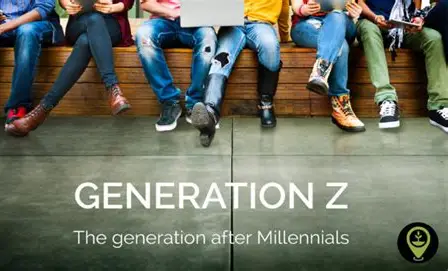Why Gen Z is Ditching Corporate Jobs—and What It Means for Global Business: The traditional career ladder, once a symbol of stability and success, is looking for a lot less appealing to the latest generation entering the workforce. Gen Z, born roughly between 1997 and 2012, are not just seeking a paycheck; they’re after purpose, flexibility, and a life that doesn’t revolve solely around their 9-to-5. This seismic shift in career aspirations is already reshaping the global business landscape, forcing companies to rethink their strategies for attracting and retaining talent. If you’re a business leader, an HR professional, or simply curious about the future of work, understanding why Gen Z is ditching corporate jobs is crucial to navigating this evolving world and preparing for what it means for global business.
The Shifting Sands of Career Ambition
For decades, landing a job at a reputable corporation was the gold standard. It promised job security, benefits, and a clear path for advancement. However, Gen Z has grown up in a world marked by economic uncertainty, rapid technological change, and a heightened awareness of social and environmental issues. These experiences have shaped their priorities, leading them to question the value proposition of the traditional corporate structure.

Beyond the Paycheck: What Truly Motivates Gen Z?
So, what exactly are Gen Z looking for that traditional corporate jobs often fail to provide?
- Purpose and Impact: This generation is deeply concerned with making a positive difference. They want their work to align with their values and contribute to something larger than themselves. A company’s commitment to social responsibility, sustainability, and ethical practices is often as important as its compensation.
- Flexibility and Autonomy: Having witnessed the stress and burnout of previous generations, Gen Z highly values work-life balance. They crave flexibility in terms of hours and location, preferring remote or hybrid models that allow them to manage their personal lives more effectively. Autonomy over their work and decision-making processes is also a key draw.
- Continuous Learning and Growth: While previous generations might have sought stability in a single company, Gen Z is driven by continuous learning and skill development. They are not afraid to switch roles or even industries if it offers new opportunities to acquire knowledge and grow professionally.
- Authenticity and Transparency: Gen Z expects honesty and openness from their employers. They are quick to spot inauthenticity and are drawn to companies that foster a genuine and transparent work environment.
- Entrepreneurial Spirit: Many in Gen Z possess a strong entrepreneurial streak. They are comfortable with the idea of building their own ventures, freelancing, or pursuing passion projects alongside or instead of traditional employment. The gig economy and the rise of creator platforms have made these alternatives more accessible and appealing.
Why Gen Z is Ditching Corporate Jobs: A Deeper Dive
The reasons behind Gen Z’s departure from the corporate world are multifaceted, stemming from a combination of societal shifts and inherent generational characteristics.
The Digital Native Advantage
As digital natives, Gen Z are comfortable with technology and adept at leveraging online platforms for communication, collaboration, and even income generation. This has opened up a world of opportunities beyond the confines of a traditional office.
- The Rise of the Gig Economy: Platforms like Upwork, Fiverr, and even social media allow Gen Z to offer their skills on a freelance basis, working for multiple clients and setting their own hours. This provides the flexibility and variety they desire.
- Creator Economy Opportunities: For those with creative talents, platforms like YouTube, TikTok, and Instagram offer avenues to build a personal brand, share their expertise, and monetize their content, often leading to a more fulfilling and lucrative career than a corporate role.
A Rejection of Outdated Hierarchies
Many Gen Z find the rigid hierarchies and bureaucratic processes common in large corporations to be stifling. They prefer flatter organizational structures where their voices can be heard and their contributions are valued more directly.
- Disdain for Bureaucracy: The slow decision-making processes and layers of management in traditional companies can be frustrating for a generation accustomed to instant gratification and rapid innovation.
- Preference for Meritocracy: While not always the reality, Gen Z often seeks environments where advancement is based on merit and performance rather than tenure or office politics.
Prioritizing Well-being Over Prestige
The stories of burnout and mental health struggles among older generations have served as cautionary tales. Gen Z are actively prioritizing their mental and physical well-being, and they see traditional corporate jobs as potential threats to this balance.
- Mental Health Awareness: Gen Z are more open about mental health challenges and expect employers to provide adequate support and foster a culture that prioritizes well-being.
- Rejecting the Hustle Culture: The glorification of overwork and the “hustle culture” is often met with skepticism by Gen Z, who aim for a sustainable and healthy approach to their careers.
What It Means for Global Business: The Great Reshuffle
The exodus of Gen Z from corporate jobs is not just a trend; it’s a fundamental shift that has profound implications for businesses worldwide. Companies that fail to adapt risk losing out on a significant portion of the future workforce.
The Talent Acquisition and Retention Challenge
Businesses are facing unprecedented challenges in attracting and retaining Gen Z talent.
- Redefining Employee Value Proposition: Companies must move beyond salary and benefits to offer a holistic employee experience that includes purpose, flexibility, growth opportunities, and a strong commitment to well-being.
- Embracing Flexible Work Models: Offering remote, hybrid, and flexible scheduling options is no longer a perk but a necessity to attract Gen Z.
- Fostering a Culture of Purpose: Clearly articulating a company’s mission and demonstrating its positive impact on society and the environment is crucial.
- Investing in Continuous Learning: Providing ample opportunities for upskilling and professional development will keep Gen Z engaged and motivated.
- Empowering Employees: Implementing flatter organizational structures and empowering employees with autonomy and decision-making authority can foster loyalty and innovation.
The Rise of New Business Models
The preferences of Gen Z are also spurring the growth of new business models and the evolution of existing ones.
- The Gig Economy Boom: Companies that can effectively leverage freelance talent and build agile teams will have a competitive advantage.
- Focus on Social Impact: Businesses with a strong social or environmental mission are likely to attract top talent and gain a loyal customer base.
- Decentralized and Remote-First Organizations: The rise of these models reflects the demand for flexibility and autonomy.
The Future of Leadership and Management
Managing a workforce increasingly comprised of Gen Z will require a different approach from leaders.
- Empathy and Understanding: Leaders need to be empathetic and understanding of the unique needs and aspirations of this generation.
- Coaching and Mentoring: The focus will shift from command-and-control to coaching and mentoring, helping individuals grow and achieve their potential.
- Digital Fluency: Leaders will need to be proficient in digital tools and comfortable with remote collaboration.
Adapting for the Future: Actionable Strategies for Businesses
To thrive in this new era, global businesses must proactively adapt.
1. Re-evaluate Your Company Culture
- Survey your current employees: Understand what’s working and what’s not, particularly for younger team members.
- Integrate purpose into your mission: Clearly define and communicate your company’s societal and environmental contributions.
- Promote transparency: Foster open communication channels and be honest about challenges and opportunities.
2. Embrace Flexibility as a Core Strategy
- Develop robust remote and hybrid work policies: Ensure these policies are inclusive and equitable.
- Explore flexible scheduling options: Consider compressed workweeks, flextime, and job sharing.
- Invest in technology: Equip your teams with the tools they need for seamless remote collaboration.
3. Prioritize Employee Well-being and Development
- Offer comprehensive mental health support: This could include EAPs, mindfulness resources, and destigmatizing mental health conversations.
- Create clear pathways for growth: Provide opportunities for skill development, mentorship, and career advancement.
- Recognize and reward diverse contributions: Move beyond traditional metrics of success.
4. Foster Entrepreneurialism Within Your Organization
- Encourage intrapreneurship: Give employees the space and resources to develop innovative ideas within the company.
- Support passion projects: Allow employees to dedicate a portion of their time to projects aligned with their interests.
Conclusion: The Gen Z Revolution is Here
The trend of Gen Z ditching corporate jobs is a powerful signal that the traditional workplace is no longer a one-size-fits-all solution. This generation is driving a necessary evolution, pushing businesses to become more human-centric, purpose-driven, and adaptable. For global business, this isn’t a crisis, but an opportunity to innovate, to build more resilient and fulfilling work environments, and ultimately, to shape a future of work that benefits everyone. By understanding and responding to the evolving needs of Gen Z, companies can not only attract and retain the talent of tomorrow but also pave the way for a more sustainable and equitable global economy. The question is no longer if businesses will adapt, but how quickly they will embrace the change brought about by this dynamic generation
Follow us on








